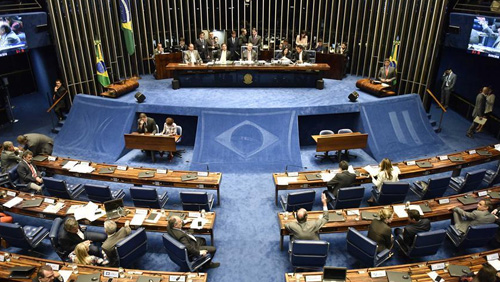A four-year-old bill seeking to legalize a wide range of gambling activities in Brazil has suffered yet another setback at the hands of state politicians.
 On Wednesday, Brazil’s Comisión de Constitución, Justicia y Ciudadanía (CCJ) voted 13-2 rejecting PLS 186/2014, which provided for the legalization of not just online gambling and sports betting, but also land-based casinos, bingo halls, video gaming, and the locally popular jogo do bicho.
On Wednesday, Brazil’s Comisión de Constitución, Justicia y Ciudadanía (CCJ) voted 13-2 rejecting PLS 186/2014, which provided for the legalization of not just online gambling and sports betting, but also land-based casinos, bingo halls, video gaming, and the locally popular jogo do bicho.
PLS 186/2014 was introduced by Senator Ciro Noguiera in 2014 and later amended by Senator Benedito de Lira to include other forms of gambling. The bill was scheduled for discussion several times last year, but committee members failed to discuss the proposal—until Wednesday, when it became the top agenda at the parliament commission’s hearing.
During the hearing, Noguiera and de Lira described the bill as the government’s answer to the growing black market operations, as it will direct the revenue from unregulated gambling services into Brazil’s state coffers. The legislation, if passed, will also pave the way for the creation of a new sector and thousands of new jobs for Brazil’s citizens.
The proposal’s opponents, however, pointed out that allowing multiple gambling services to operate in the country will only result in an increase problem gambling and crime rates.
Wednesday’s hearing may have ended on a negative note, but Noguiera and de Lira’s proposal still has a chance to be heard in the National Congress and voted in a plenary meeting, but only if a senator files a motion for review.
In a post, BetConsult President and lawyer Edgar Lenzi speculated that the “last-minute vote change” made by some senators “may have been the strategy to strengthen the new tourism bill.”
Lenzi was referring to the Ministry of Tourism’s urgent request for consideration of a plan to legalize integrated resorts. The plan combines several pieces of legislation, including a bill calling for the creation of the Brazilian Tourism Promotion Agency and another amending the National Tourism Policy to define the federal government’s role in overseeing the nation’s tourism industry, in order to legalize resort casinos in two states—Rio de Janeiro and Sao Paulo. The proposal ignores other gambling verticals, including online gambling.
“With PLS 186/2014 rejected by the CCJ of the Senate, which shows that it has lost strength, on the other hand, the New Law of Tourism gains strength. Both projects can still be voted on,” Lenzi wrote on Portuguese-language Games Magazine Brazil.